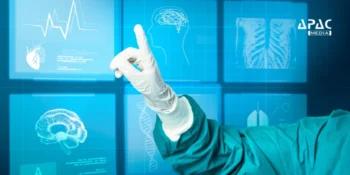Even as AI acceptance is becoming mainstream across different sectors, healthcare has been leveraging AI in prevention, treatment and rehabilitation. Anannya Saraswat from CXO News and APAC News Network explores the applications, benefits, and consequent challenges of harnessing AI for a healthier future.
It has just been a few days since this year’s Nobel Prize in Chemistry was announced. Demis Hassabis, John Jumper, and David Baker were awarded the prize for their pathbreaking work in ‘computational protein design’- a field driven by Artificial Intelligence- for harnessing its power to discover new drugs, vaccines, and therapeutic agents. This has once again put the limelight on how AI is pushing the boundaries of healthcare innovation.
AI’s Breakthroughs in the Healthcare Landscape
Prevention, Treatment, and Rehabilitation are the three important stages in the continuum of healthcare. When we talk about the deployment of AI in the healthcare industry, all three stages deserve equal attention.
Let us understand how AI is utilized at each stage one by one.
IN PREVENTION:
Early Detection of Disease for reducing hospital burden
Early disease detection can help healthcare professionals intervene before the symptoms worsen. Here, AI algorithms, specifically machine learning models, mobile apps, and chatbots can predict the onset of cancer, diabetic retinopathy, cardiovascular issues, viral diseases, etc much earlier than traditional methods.
- AI-Powered Mobile Application: Harish Bisam, Founder and MD, Bisam Pharmaceuticals reveals how his AI-powered mobile application, QuickVitals, is bringing healthcare to the fingertips! The app detects early warning signs of diseases through continuous analysis of vital health parameters such as blood pressure, heart rate, oxygen level, stress level, etc, thereby enabling timely intervention and reducing the burden on hospitals.

Bisam Pharmaceuticals
“The app leverages advanced AI and deep learning through Photoplethysmography (PPG), a non-invasive technique using infrared light, to provide rapid health assessments. An individual can download the application and can get detailed health insights in just 20-60 seconds either through contactless spot checks through mobile cameras or continuous monitoring with PPG sensors,” he explains.
- AI-powered Chatbots: During COVID, Mumbai’s Fortis Hospital launched an AI-powered Chatbot to help patients assess their risk of contracting the virus and figure out if they need to get tested. This tool was a self-assessment platform that asked questions and helped users gauge the risk of getting infected with the virus.
- AI-powered detection of life-threatening diseases: Earlier this year, AIIMS Delhi unveiled an AI- solution for early detection of cancer. Developed with the Centre for Development of Advanced Computing, Pune under the Ministry of Electronics and Information Technology, the AI system runs on deep learning models capable of analyzing complex medical data with excellent accuracy and efficiency. The AI model has been trained using a data set of 500,000 radiological and histopathological images from 1,500 cases of breast and ovarian cancers, the two most common types of cancer.
Monitoring
Wearable devices, such as smartwatches and fitness trackers, collect real-time health data like heart rate, sleep patterns, and activity levels. AI can then process this data to detect irregularities or unhealthy patterns and provide actionable insights.
- ‘Spandan’, the real-time cardiac monitor: Rajat Jain, CEO of Sunfox Technologies

Rajat Jain
CEO
Sunfox Technologiesand developer of Spandan, highlights the use of AI in healthcare to make cardiac monitoring more accessible and efficient. “The “Spandan” device uses edge-based AI algorithms to detect over 40 cardiac abnormalities in real-time, allowing for quick and easy cardiac screening without requiring medical expertise,” says Jain. The AI in Spandan helps ensure that the ECG readings are analyzed instantly, providing actionable information to both patients and doctors. This use of AI has been pivotal in decentralizing healthcare, allowing cardiac monitoring to be performed anytime, anywhere, even in rural or remote areas. The AI technology also integrates with hospital systems, enabling remote monitoring and timely response from clinicians.
- Fortis Escorts’ ‘Holter Monitor’: Ashok Seth, Chairman, Fortis Escorts reemphasizes

Dr. Ashok Seth Chairman Fortis Escorts the role of AI-powered wearables and trackers to continuously monitor health parameters. He explained how the tracker developed by Fortis Escorts called ‘Holter Monitor’, is helping patients in self-assessment of their heart health and greatly reducing the burden on hospitals!
“Patients with conditions like heart failure go home with a wearable device that tracks their heart rate, blood pressure, and other parameters. This device can predict health issues, such as fluid retention in heart failure patients, allowing doctors to intervene early and prevent emergencies,” informed Seth.
Predictive Analytics for Pandemic Readiness
Although still in its nascent phase, AI’s capability to analyze large datasets can be used to predict future healthcare crises and prepare the healthcare infrastructure for disease outbreaks.
“AI can play a crucial role in early detection and surveillance. By analyzing vast amounts of data, AI can detect early signs of outbreaks and track the spread of infections in real time. This enables faster public health interventions and more effective containment strategies. AI-powered tools can automate contact tracing, identify hotspots, and optimize resource allocation. This helps prevent the further spread of diseases and ensures resources are deployed effectively,” explains Bisam.
Moreover, AI can also accelerate drug discovery and vaccine development according to Bisam. By analyzing existing drugs and simulating clinical trials, AI can help identify potential treatments and bring vaccines to market more quickly. Another area where utilizing AI can prove beneficial is Vaccine Management. AI can significantly enhance vaccine distribution and supply chain management. It can help optimize distribution plans and ensure the timely delivery of essential supplies.
IN TREATMENT:
Medical Imaging, Diagnosis, and Patient Registration
AI is being rapidly integrated by hospitals for analyzing imaging such as CT scans, MRIs, and X-rays to diagnose and treat diseases and injuries. This has enhanced accuracy and speed in detecting anomalies like tumors, fractures, and other conditions.
- Earlier this year, the Rajiv Gandhi Cancer Institute adopted an AI-powered image management platform to improve diagnostic precision, enhance workflow, and provide personalized care to patients.
- Dr Ashok Seth reveals that AI is also being used to assist doctors in interpreting ECGs. It enables non-specialists, like nurses, to accurately interpret ECG results, which supports doctors in making clinical decisions by filtering out unnecessary data and focusing on important signals.

Director
AIIMS Bhopal
- AI is also easing the process of managing patient data. In this regard, Dr. Ajai Singh, Director, AIIMS Bhopal, informs that the hospital has initiated the use of AI for patient registration and medical report analysis, though the process is still in its early phase.

Director
Apex Hospital
- In addition, Sachin Jhawar, Director, Apex Hospital, explains that they are working on AI and Machine Learning Technologies in areas like patient identification through face recognition and speech-to-text systems for streamlining operational processes.
Assisting doctors in surgeries
AI can assist doctors in surgeries by enhancing precision, reducing human error, and improving decision-making. AI-powered systems like surgical robots can perform intricate tasks with greater accuracy, enabling minimally invasive procedures. The algorithms analyze real-time data from scans and sensors, providing surgeons with critical insights during the operation. Additionally, AI can help in pre-operative planning by creating detailed models of the patient’s anatomy and predicting potential complications. This leads to more efficient surgeries, reduced recovery times, and better patient outcomes.

Regional COO
HCG Hospital
- Manisha Kumar, Regional COO, HCG Hospital discusses the transformative impact of AI and machine learning in aiding doctors during tumor surgeries. “AI-enabled systems assist doctors by identifying tumor characteristics and diagnostic metrics that might be overlooked, enhancing both diagnosis and research,” she adds.

Upasana Arora
Managing Director
Yashoda Super Specialty HospitalsYashoda Hospital, Delhi, is incorporating AI into surgeries to enhance precision, efficiency, and patient outcomes. Upasana Arora, Managing Director, Yashoda Super Speciality Hospitals reveals that AI-enabled robotic surgeries are now being implemented in her hospital. “The technology assists surgeons by providing real-time data analysis and enhanced imaging, leading to more accurate incisions and decision-making during complex surgeries. In addition, robot-assisted surgeries also help in optimized blood usage,” adds Arora.
- In May this year, doctors at Vadamalayan Hospital in Madurai successfully performed the first AI-enabled knee replacement surgery. The use of AI technology helped enhance precision in implant positioning, alignment, and balancing, which are critical for the success of knee surgeries. The AI-assisted system provided real-time feedback to the surgeons, improving surgical accuracy and reducing the risk of complications. The hospital expects that this advanced approach will lead to better patient outcomes, including faster recovery and improved mobility.
AI for Mental Health
AI can be used for mental health treatment through applications like virtual therapy, chatbots, and personalized mental health monitoring. AI-powered platforms can provide behavioral therapy, offer emotional support, and guide users through mental health exercises.
- Fortis Healthcare’s AI-enabled mental health platform: The private hospital network partnered with United We Care in May this year to launch ‘Adayu Mindfulness’, a platform offering personalized self-assessment tools and 24/7 access to a virtual assistant, Stella, which connects users with mental health specialists. This initiative aims to improve accessibility to mental healthcare and reduce mental health stigma in India. By integrating AI with clinical expertise, the hospital aims to address the growing mental health needs, providing services like acute psychiatry, addiction treatment, and rehabilitation support.
IN-HOME REHABILITATION:
Home Rehabilitation and post-treatment home care are fields that are now being explored in India and AI can play a huge role by offering personalized, data-driven care tailored to each patient’s recovery needs. Virtual rehabilitation platforms can use AI to guide patients through exercises, ensuring correct form, and motivating engagement through gamification.
- Ashok Seth brings forward Fortis Escorts’ initiative in this domain. The hospital has already begun with a home rehabilitation program wherein patients recovering from heart attacks, surgeries, or angioplasty can recover in the comfort of their homes. AI-powered Virtual counseling is provided for exercise and diet. In addition, psychological support is also provided which helps patients regain confidence, track their progress, and avoid readmissions to the hospital. This is aimed at empowering patients and personalizing their recovery process.
The Challenges for a ‘Health’y AI
Despite its immense potential to transform healthcare, AI faces significant challenges that must be addressed for its successful implementation.
Data-related concerns: According to Harish Bisam, data-related hurdles are a primary concern. “Ensuring data privacy and security, particularly when dealing with sensitive patient information, is paramount. Additionally, the quality and availability of data can be a limiting factor. Inconsistent, incomplete, or siloed data can hinder AI’s effectiveness,” he adds.

Regional Chief Operating Officer
KIMS Hospitals
Saurabh Gupta, Regional Chief Operating Officer, KIMS, also emphasized the need for accurate data in the integration of AI and machine learning for effective healthcare analytics. “Many hospitals,” Gupta notes, “fail to leverage vast patient reports due to inaccuracies, limiting their potential.”
Lack of skilled professionals: Beyond data complexity, the lack of skilled personnel for integrating AI-powered solutions in healthcare also poses a challenge. Nikhil Goel, Vice President & Head of IT Projects, at Max Healthcare, highlights this barrier of finding skilled professionals with both clinical and AI expertise. “Unlike other industries where AI talent is more readily available, healthcare requires professionals who understand both clinical data and AI technologies, which creates a talent gap, which is a major challenge,” concludes Goel.
Resistance to change: Integrating AI with existing healthcare systems can be complex due to interoperability issues and the presence of legacy systems. Gupta too identifies that convincing doctors to adopt new healthcare processes is a major challenge, as they often resist change. There can be two strategies for overcoming this resistance: engaging influential, high-volume doctors to lead changes and using a bottom-up approach by aligning the majority of doctors to create pressure on key influencers.
High costs: Another roadblock in integrating AI solutions in the Indian healthcare industry is the high cost of implementation and infrastructure requirements. The focus should be on making technology robust and cost-effective. “Many healthcare technologies are still in the beta phase and larger hospitals need to support and absorb the initial costs to help these technologies become mature and scalable,” opines Sachin Jhawar.
Fragmented infrastructure: According to Dr. Seth, one of the primary challenges in the current implementation of AI in healthcare is fragmentation and lack of integration between upstream and downstream processes. Dr. Seth mentions that “while there is a strong push for digital technologies from policymakers and government leaders, achieving seamless integration among all stakeholders—policymakers, doctors, nurses, and the industry—is crucial.” In addition, training more people and ensuring that everyone, from healthcare providers to patients, is on the same page is another key challenge. The need is to foster greater collaboration and ensure trust among different stakeholders, making it simpler for industries to innovate and effectively deploy AI solutions.
The Way Forward
The integration of AI in healthcare has already begun to transform patient care, enabling early disease detection, enhancing treatment precision, and personalizing rehabilitation. Yet the challenges of data privacy, skill gaps, and cost of implementation need to be addressed for the effective utilization of AI models.
Building robust AI-enabled healthcare infrastructure would also require making the adoption of AI technologies easier for both patients and hospitals for its deeper penetration. In addition, raising awareness, building trust among communities, and strengthening regulatory measures for grievance redressal are also areas that need to be prioritized. Going forward, all relevant stakeholders including the government, hospitals, community-based organizations, and tech experts should come together to further develop the AI healthcare landscape in India.











































































Discussion about this post